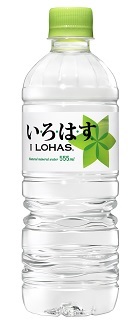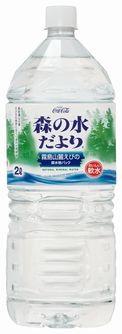September 1, 2014
Coca-Cola Japan Providing Mineral Water Products for Kyoto University's Water Circulation Research Project
Keywords: Corporate Manufacturing industry Water


Copyright Coca-Cola Japan Co. All Rights Reserved.
Coca-Cola Japan Co. announced on May 8, 2014, that it will provide bottled mineral water products as sample materials for a water circulation research project at Kyoto University, Japan, and that the Coca-Cola Foundation will support the forest-water investigation of Kyoto University, of which this project is a part.
Coca-Cola's mineral water products are produced using mineral water from limited reservoir areas designated based on scientific data. In addition, the groundwater for these products is pumped via a process that meets certain conditions, and is then packed in PET (polyethylene terephthalate) bottles, which can be easily handled. The products are open-dated and thus the quality of products can be firmly controlled. With these characteristics, Coca-Cola mineral water products are assured to be suitable sample materials for mid- and long-term research into changes in water circulation because of their easy collection and storage, as well as their simplified data management.
Regular rainwater collection has so far been necessary for water circulation research, which requires large-scale and systematic on-site observation and water collection investigations. Therefore, it has been difficult for individual university research teams to approach the issue. However, Kyoto University researchers have confirmed that rain water data are reflected in underground water; therefore, it is possible for a university team to conduct broad-based and continuing research on water circulation by utilizing mineral water products made from underground water from limited sources designated based on scientific data and managed responsibly.
Kyoto University, Coca-Cola Japan and the Coca-Cola Foundation intend to work jointly on the issues in order to build up a sustainable society that includes water source conservation, prevention of water disasters, and control of climate change through on-site observation and/or forecast verification investigations in the environmental field.
Related JFS Articles
Related
"JFS Newsletter"
- 'Good Companies in Japan' (Article No.4): 'Eightfold Satisfaction' Management for Everyone's Happiness
- 'Good Companies in Japan' (Article No.3): Seeking Ways to Develop Societal Contribution along with Core Businesses
- "Good Companies in Japan" (Article No. 2): Seeking "Happiness" for All Stakeholders
- "We Sell Services, Not Products": Using LCA to Measure the Environmental Benefits of Nihonkai Gas's Heater Rentals
- "Good Companies in Japan" (Article No. 1): Valuing Employee Happiness and Trust
Related
"Popular Articles"
- Japanese Organic Produce Supplier Wins 2014 Award of Excellence from Food Action Nippon
- DBJ Launches Green Building Certification for Residential Developments
- Kawasaki City and Toshiba to Jointly Demonstrate Renewables and Hydrogen-Based Off-Grid Energy Supply System
- LIXIL Establishes Women Empowerment Plan Called WeDo Action
- NEC Develops Software for Storage Batteries, Helping to Improve Next-generation Power Systems


